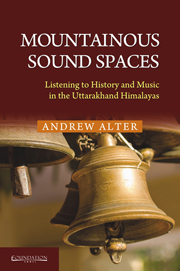Book contents
- Frontmatter
- Contents
- List of Figures
- List of Tables and Musical Examples
- Preface
- Acknowledgements
- Introduction
- 1 Echoes of Colonialism: Bagpipes in the Himalayas
- 2 Echoes of a Royal Heritage: Vestiges of Naubat
- 3 Possession and Performance: Sounding Out the Epic Worlds of Heroes and Gods
- 4 Worlds of Sound: Revisiting the Parameters of Oral Tradition
- 5 Flutes, Sprites and Mountainous Geographies
- 6 Drum Strokes, Syllables and Rhythmic Patterns
- 7 The Significance of Tantric Sects for Drum Practice in the Central Himalayas
- 8 Playing History: Sounding Out the Epic Worlds of Heroes and Gods
- 9 The Legacy of Garhwali Cassettes: Remembering the Pre-digital Age of Music Commodification
- Epilogue: Listening to an Uttarakhandi Himalayan Space
- Bibliography
- Index
1 - Echoes of Colonialism: Bagpipes in the Himalayas
Published online by Cambridge University Press: 05 October 2014
- Frontmatter
- Contents
- List of Figures
- List of Tables and Musical Examples
- Preface
- Acknowledgements
- Introduction
- 1 Echoes of Colonialism: Bagpipes in the Himalayas
- 2 Echoes of a Royal Heritage: Vestiges of Naubat
- 3 Possession and Performance: Sounding Out the Epic Worlds of Heroes and Gods
- 4 Worlds of Sound: Revisiting the Parameters of Oral Tradition
- 5 Flutes, Sprites and Mountainous Geographies
- 6 Drum Strokes, Syllables and Rhythmic Patterns
- 7 The Significance of Tantric Sects for Drum Practice in the Central Himalayas
- 8 Playing History: Sounding Out the Epic Worlds of Heroes and Gods
- 9 The Legacy of Garhwali Cassettes: Remembering the Pre-digital Age of Music Commodification
- Epilogue: Listening to an Uttarakhandi Himalayan Space
- Bibliography
- Index
Summary
Bazaars in most towns throughout Uttarakhand offer the usual merchandise one would expect to find in a North Indian urban market. Street vendors compete for space in front of more permanent shops as crowds of pedestrians, motorcycles, cars and buses squeeze through the narrow streets. Most of the goods are brought up from the plains while some local merchandise may be found scattered among the imported items. Distribution networks of a capitalist economy ensure employment for wholesalers as well as truck drivers responsible for moving goods between markets and distribution points. Hill potatoes, cucumbers, pumpkins, beans and apples make an appearance in market displays beside spinach from Punjab, oranges from Nagpur, Guavas and Mangoes from UP and eggplants from Haryana. In other shops, household goods and readymade clothing arrive from production centres in the plains. Metalware shops display the standard steel plates, tumblers, cutlery and kitchen utensils that one would expect, while brass and copper banṭhās (water containers) are added for local residents wanting to purchase something from their own region. In the back of these same shops there might also be a brass barrel-shaped ḍhol or a copper bhaṅkorā (trumpet).
Frequently in these towns there is also a vendor selling compact discs, VCDs and DVDs. These have largely replaced the audio cassettes and VHS tapes that were once the dominant analogue formats of the 1980s and 1990s. Music vendors target a clientele who want to hear the most recent popular hits of the film industry or see the most recent compilation of dance ‘item numbers’ from Mumbai. Nonetheless, as with items for sale in other shops, Uttarakhandi products find space, albeit a more marginal space, next to the imports. Big name local singers provide a Garhwali nuance to the commodified sounds and VCDs on offer. Garhwali regional films use the voices of these stars as playback singers to express a local identity within a style clearly influenced by Mumbai’s dominant aesthetic.
- Type
- Chapter
- Information
- Mountainous Sound SpacesListening to History and Music in the Uttarakhand Himalayas, pp. 1 - 16Publisher: Foundation BooksPrint publication year: 2014



